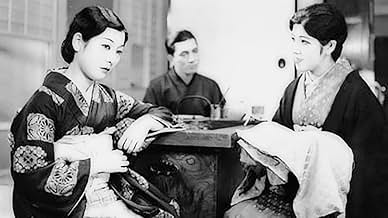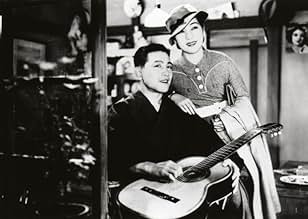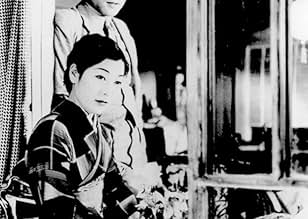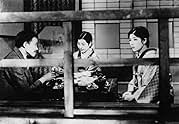NOTE IMDb
7,5/10
586
MA NOTE
Ajouter une intrigue dans votre langueWhen she reaches adulthood, a precocious young woman sets out to find her biological father, who, as her mother tells her, abandoned them for another woman.When she reaches adulthood, a precocious young woman sets out to find her biological father, who, as her mother tells her, abandoned them for another woman.When she reaches adulthood, a precocious young woman sets out to find her biological father, who, as her mother tells her, abandoned them for another woman.
- Réalisation
- Scénario
- Casting principal
- Récompenses
- 1 victoire au total
Avis à la une
This is a tender love story taking place about the time when the Japanese war machine was raping Nanking (Nanjing), enslaving Korean women, attacking the Philippines, and preparing to bomb Australia and America. These contrasts are startling as is the contrast that is in the lesson of the film. Naruse-san teaches us once again that the truth about a person resides not in the words and inferences spoken, rather in direct observation and understanding. Here we have a young women approaching the age of independence being raised by her mother who continually painted the absent father as an unfaithful woman chaser living with a woman of ill repute. The daughter wants to actually meet her father and she wonders why he left her and her mother. She trains to the remote village where the father lives with the infamous lady.
The actual meeting, first when the father and daughter view each other from a distance is the perfect technique Naruse-san used in other films, to the actual polite, respectful way the Japanese greet each other, is quite emotional and the viewer senses the love each has for the other, bridging the years of separation.
The daughter is quite surprised to learn that the so-called infamous woman is simply a very plain and loving farm lady with no special beauty nor male allure. She quite simply loves the man she lives with; she is a marvelous rose, something the man's wife was not.
As far as I know, the film is not available on DVD. I wish it were.
The actual meeting, first when the father and daughter view each other from a distance is the perfect technique Naruse-san used in other films, to the actual polite, respectful way the Japanese greet each other, is quite emotional and the viewer senses the love each has for the other, bridging the years of separation.
The daughter is quite surprised to learn that the so-called infamous woman is simply a very plain and loving farm lady with no special beauty nor male allure. She quite simply loves the man she lives with; she is a marvelous rose, something the man's wife was not.
As far as I know, the film is not available on DVD. I wish it were.
A very dear film by the young Naruse Mikio, and the theme is what it so often is in the great Japanese cinema of the 1930s, 40s and 50s: the heart wants what it wants. The lovely daughter is played by Chiba Sachiko, and she would later marry Naruse. The wonderful Japanese actor Maruyama Sadao plays the father. Maruyama would later be exterminated in the U.S. terror bombing of Hiroshima.
For years I avoided seeing this film because I thought the title implied it was a sexist drama about women forced to be submissive. Finally seeing it now, a more accurate title would be More than One Way to be a Wife. This short film (approximately 75 minutes) conveys more about relationships than most American films do in two hours. And it is still relevant, now 82 years after it was released. How many current films will still be relevant in 82 years? Not many.
I highly recommend this film to anyone interested in marriage and relationships and in the misunderstandings that can occur when people are not honest with each other about who they are and what they need to be happy in life.
I will not reveal more about the plot, just let it unfold and see for yourself....
I highly recommend this film to anyone interested in marriage and relationships and in the misunderstandings that can occur when people are not honest with each other about who they are and what they need to be happy in life.
I will not reveal more about the plot, just let it unfold and see for yourself....
Although not quite as famous as 1950s Japan's Golden Age of Cinema, movies from the Land of the Rising Sun in the 1930s were experiencing quite a bit of popularity in Asia. However, United States film fans were oblivious to the great works coming out of Japan until director Minoru Naruse's September 1935's "Wife! Be Like A Rose!" The now-Japanese classic finally was shown two years later in America after its initial release. An untimely New York Times' scathing review of the film put an end to its domestic showing, but other more aware critics acknowledged its innovative visuals were unique in filmmaking.
"Wife! Be Like A Rose!" has drawn parallels to films coming out of the French New Wave movement in the 1950s rather than belonging to the mid-1930s. Naruse's forte was heavily-focused on his female characters. Its plot centers around a daughter, Kimiko (Sachiko), about to get married. Her father had left the family 15 years earlier and remarried a geisha woman in the countryside. Kimiko hopes to get her father to walk her down the aisle at her wedding, but her finance's father insists he meets him before he does. Kimiko's troubles are compounded by a depressed mother who pines for her ex-husband and writes sad poems all day.
The character Kimiko can easily be placed in today's world. Director Naruse's "sprightly, modern feel" reflects Kimiko's progressiveness as a departure from her mother's traditionalistic behavior in marriage. "What makes this film so fascinating is the sheer level of characterization that goes into so many of the onscreen personalities," notes film reviewer Miles Imhoff. "Wife! Be Like A Rose!" was the winner of the 1936 Kinema Junpo Award for Best Film of the Year-equivalent to the Academy Awards Best Picture. Although Naruse was recognized as one of Japan's most influential directors at the time, his studio, Toho, besides "Wife! Be Lake A Rose!" had a habit of giving him weak scripts. He felt his superior filmmaking techniques were required to overcome the bad plots as well as the bad acting from the studio's contracted actors. After World War Two Naruse was a member of a select group of directors responsible for the resurgence of Japanese 1950s films in its golden age of film.
"Wife! Be Like A Rose!" has drawn parallels to films coming out of the French New Wave movement in the 1950s rather than belonging to the mid-1930s. Naruse's forte was heavily-focused on his female characters. Its plot centers around a daughter, Kimiko (Sachiko), about to get married. Her father had left the family 15 years earlier and remarried a geisha woman in the countryside. Kimiko hopes to get her father to walk her down the aisle at her wedding, but her finance's father insists he meets him before he does. Kimiko's troubles are compounded by a depressed mother who pines for her ex-husband and writes sad poems all day.
The character Kimiko can easily be placed in today's world. Director Naruse's "sprightly, modern feel" reflects Kimiko's progressiveness as a departure from her mother's traditionalistic behavior in marriage. "What makes this film so fascinating is the sheer level of characterization that goes into so many of the onscreen personalities," notes film reviewer Miles Imhoff. "Wife! Be Like A Rose!" was the winner of the 1936 Kinema Junpo Award for Best Film of the Year-equivalent to the Academy Awards Best Picture. Although Naruse was recognized as one of Japan's most influential directors at the time, his studio, Toho, besides "Wife! Be Lake A Rose!" had a habit of giving him weak scripts. He felt his superior filmmaking techniques were required to overcome the bad plots as well as the bad acting from the studio's contracted actors. After World War Two Naruse was a member of a select group of directors responsible for the resurgence of Japanese 1950s films in its golden age of film.
10Red-125
The Japanese film "Tsuma yo bara no yô ni" was shown in the United States with the title, "Wife! Be Like a Rose!" or "Kimoko" (1935). It was directed by Mikio Naruse.
This film was the first major film directed by Naruse, but it's clear that he had already mastered the art of cinema. Naruse's films are typically melodramas about middle-class or working-class people. His movies, like this one, are often tinged with sadness.
Sachiko Chiba plays Kimiko Yamamoto, a young office worker who has a modern outlook and dresses in western fashion. She lives with her mother, who is a talented poet. However, her mother is depressed, and most of the poems she writes are about her husband, who has left the family and moved to the countryside.
Kimiko travels to her father's village, in order to convince him to return home to his wife and to her. When she meets with her father, she learns that matters are not at all what they had seemed.
I wish I could write more about this very interesting plot, but the enjoyment of this film depends upon the unexpected events that occur during and after Kimiko's trip. I have no intention of spoiling the movie for those reading this review.
We saw this film at the Dryden Theatre, in an original 35mm print that is owned by The George Eastman Museum. It's hard to believe that this movie is apparently unavailable in the U.S. on DVD. In fact, I hesitated to review it, because what's the point of a review if no one can see the film? However, the movie was excellent, and possibly it will play in a Naruse retrospective in your location. If so, don't miss it!
Note: In 1937, two years after the film was made, Naruse married the star of the film--Sachiko Chiba. Sadly, life followed art, and they were divorced three years later.
This film was the first major film directed by Naruse, but it's clear that he had already mastered the art of cinema. Naruse's films are typically melodramas about middle-class or working-class people. His movies, like this one, are often tinged with sadness.
Sachiko Chiba plays Kimiko Yamamoto, a young office worker who has a modern outlook and dresses in western fashion. She lives with her mother, who is a talented poet. However, her mother is depressed, and most of the poems she writes are about her husband, who has left the family and moved to the countryside.
Kimiko travels to her father's village, in order to convince him to return home to his wife and to her. When she meets with her father, she learns that matters are not at all what they had seemed.
I wish I could write more about this very interesting plot, but the enjoyment of this film depends upon the unexpected events that occur during and after Kimiko's trip. I have no intention of spoiling the movie for those reading this review.
We saw this film at the Dryden Theatre, in an original 35mm print that is owned by The George Eastman Museum. It's hard to believe that this movie is apparently unavailable in the U.S. on DVD. In fact, I hesitated to review it, because what's the point of a review if no one can see the film? However, the movie was excellent, and possibly it will play in a Naruse retrospective in your location. If so, don't miss it!
Note: In 1937, two years after the film was made, Naruse married the star of the film--Sachiko Chiba. Sadly, life followed art, and they were divorced three years later.
Le saviez-vous
- AnecdotesThis was possibly the first fictional feature film from Japan to be distributed in the United States, under the name "Kimiko."
- ConnexionsRemade as Koi ni mezameru koro (1969)
Meilleurs choix
Connectez-vous pour évaluer et suivre la liste de favoris afin de recevoir des recommandations personnalisées
Détails
- Date de sortie
- Pays d’origine
- Langue
- Aussi connu sous le nom de
- Wife! Be Like a Rose!
- Société de production
- Voir plus de crédits d'entreprise sur IMDbPro
- Durée1 heure 14 minutes
- Couleur
- Mixage
- Rapport de forme
- 1.37 : 1
Contribuer à cette page
Suggérer une modification ou ajouter du contenu manquant

Lacune principale
By what name was Ma femme, sois comme une rose (1935) officially released in Canada in English?
Répondre



















